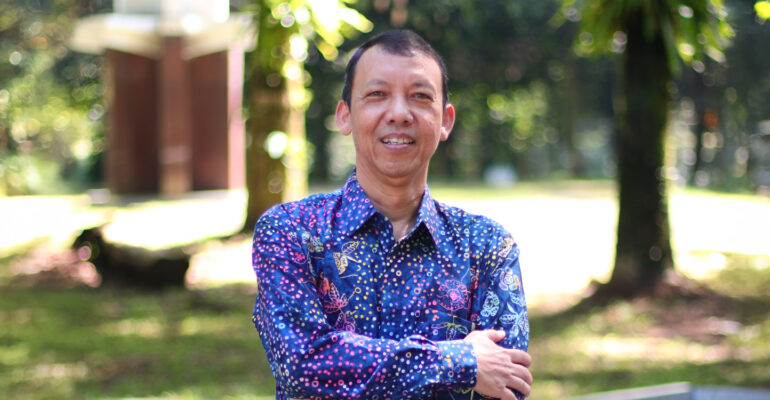IPB University Researcher’s Contribution to Indonesian Aquatic Biology: Stable Isotopes to Explore Aquatic Food Webs

Detecting who eats whom in aquatic ecosystems no longer relies solely on direct observation or stomach content analysis. Through the stable isotope approach of carbon (δ¹³C) and nitrogen (δ¹⁵N), scientists are now able to reconstruct food webs with more precision and nondestructively.
One of the pioneers of using this method in Indonesia is Prof Yusli Wardiatno, an IPB University researcher from the Department of Aquatic Resource Management, Faculty of Fisheries and Marine Science (FPIK).
Stable isotopes work like a “chemical fingerprint” that can reveal the main food source of an organism and its trophic position in the food chain. This method has been applied by Prof Yusli in various researches, including in a collaborative study with the University of the Ryukyus, Japan, on the Manko mangrove ecosystem in Okinawa.
His research showed that most macrozoobenthos species such as Cerithidea, Cassidula mustelina, Uca, and Grapsidae utilize sediments as their main food source, which contain decomposition products from microflora and microphytobenthos.
It doesn’t stop there, a similar approach has been applied in Indonesia, as in a recent study of the Lubuk Damar mangrove ecosystem in Aceh Tamiang. This study showed that mangrove litter plays a dominant role in supporting macrozoobenthos biomass.
Laboratory analysis for stable isotope measurements was conducted in collaboration with the Bandung Institute of Technology (ITB), which has the necessary isotope mass spectrometry instrument facilities. This collaboration shows the importance of synergy between institutions in supporting cutting-edge research in the field of aquatic ecology.
The research also involved Dr Ananingtyas S Darmarini, a young lecturer from Djuanda University, who played a role in the development and application of the stable isotope method. Dr Ananingtyas was one of Prof Yusli’s mentors during his doctoral program at IPB University. The role of this young generation of researchers is an important part of the scientific relay and strengthening of basic research on aquatic ecosystems in Indonesia.
“With stable isotopes, we can read ‘invisible traces’ in aquatic systems. Understand who eats who, where the energy comes from, and how to maintain the balance,” said Prof Yusli.
This contribution becomes very relevant amidst the challenges of coastal environmental degradation. In addition to producing reputable international publications, Prof Yusli’s research also encourages the strengthening of biomolecular and isotope research capacity in Indonesia.
With the support of international collaborations and transdisciplinary approaches, these studies open new horizons in a more sustainable and science-based management of aquatic resources. (*) (IAAS/Ard)



